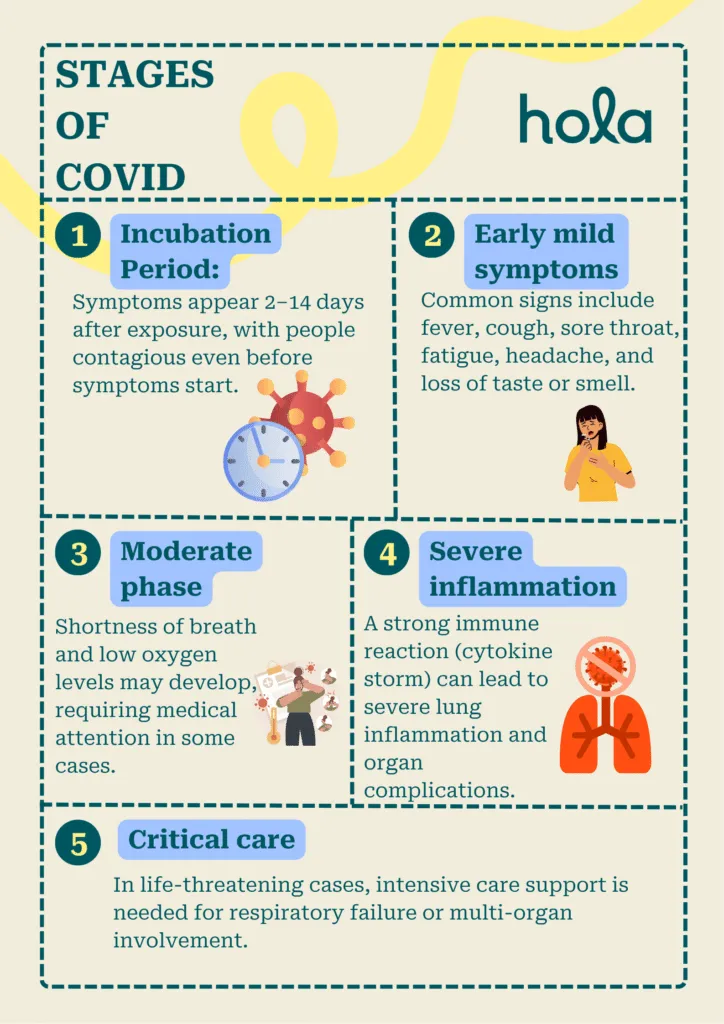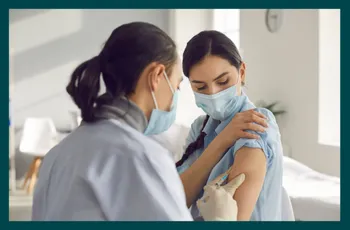What are the first signs of COVID?
Written by the editorial staff writer at Hola. Medically Reviewed by Dr Nelson Lau, MBBS FRACGP, GP & Digital Health Specialist.

Contents

Summary: Early signs of COVID-19 include fever, fatigue, dry cough, sore throat, and loss of taste or smell. Some people may also experience headaches, body aches, or, less commonly, gastrointestinal symptoms such as nausea or diarrhoea. Spotting these symptoms early enables quick testing, isolation, and medical care, helping reduce the transmission and safeguard public health.
Since the onset of the pandemic, COVID-19 has shown a wide range of symptoms, making it tricky to identify early on. Spotting initial signs is crucial for preventing its spread and seeking timely care. While symptoms can vary from person to person, some common early indicators often point to the start of a COVID-19 infection.
Most common signs of COVID
What does the very beginning of COVID feel like?
At the onset of COVID-19, it can feel similar to having a mild cold or the flu. You may notice:- A mild fever or chills
- Low energy or fatigue
- Headache or body aches
- A dry, scratchy throat
- Loss of smell or taste
- Nasal congestion or a runny nose
What does a mild case of COVID feel like?
A mild case of COVID-19 often involves symptoms that are similar to a common cold or mild flu, including:- Fatigue
- Congestion or a runny nose
- Headache
- Sore throat
- Fever or chills
- Body aches
- Diarrhoea
What are the most common signs of COVID?
The most common signs of COVID-19 may differ slightly depending on the variant, but generally include:- Loss of taste or smell
- Fever or chills
- Shortness of breath
- Dry cough
- Headache
- Body ache
- Nasal congestion
- Nausea or vomiting
- Diarrhoea
When to consult a doctor?
You should seek medical advice immediately if you experience:- Difficulty breathing or shortness of breath
- Chest pain or pressure
- Persistent high fever that doesn’t decrease
- Confusion or difficulty staying awake
- Bluish colouration of the lips or face
- Symptoms that intensify after a few days
- If you belong to a high-risk demographic (e.g., elderly, pregnant, people with chronic health issues, immunocompromised individuals, and Aboriginal and Torres Strait Islander peoples.)
How can telehealth help
Telehealth provides a secure and convenient method for addressing COVID-19 symptoms and associated health issues from the comfort of home. Hola Health’s telehealth platform offers reliable, 24/7 access to medical assistance for COVID-related concerns, including:- Telehealth appointment online: Patients can connect with qualified doctors to discuss symptoms such as fever, sore throat, cough, or fatigue. The physician will evaluate the severity, recommend testing, isolation, or treatment, and aid in distinguishing between COVID, the flu, or a cold.
- Immediate prescriptions: If treatment is necessary, such as COVID antiviral medications or relief for symptoms, the doctor can directly send a prescription to a local pharmacy or organise same-day delivery.
- Doctor referrals: For cases that are moderate to severe, the telehealth provider can direct patients to in-person care, chest X-rays, or consultations with specialists if required.
- Online medical certificate: Hola Health can provide medical certificates for time off work, school, or isolation documentation under public health guidelines.
Act fast against COVID See if antivirals are right for you!
See a Doctor now
Available 24/7, across Australia.
What are the stages of COVID?
COVID-19 generally advances through several phases, although the intensity and duration may differ among individuals:- Incubation phase: Following exposure, symptoms typically emerge within 2 to 14 days—most frequently around day 5. During this interval, a person can be contagious even when they do not exhibit symptoms.
- Initial infection (mild phase): This phase includes signs such as fever, exhaustion, dry cough, sore throat, headache, and loss of taste or smell. Some individuals may also experience gastrointestinal issues like nausea or diarrhoea. The majority of cases remain mild and improve with rest and home care.
- Pulmonary phase (moderate to severe): If the virus extends to the lungs, it may cause shortness of breath and reduced oxygen levels. This phase may necessitate medical intervention, particularly for those at higher risk.
- Cytokine storm phase (in severe instances): In certain cases, particularly without appropriate treatment, an excessive immune reaction can arise, resulting in intense inflammation, acute respiratory distress syndrome (ARDS), and complications involving multiple organs. This phase may require care in an intensive care unit (ICU).

Frequently asked questions
How do I know if it's COVID or a cold?
COVID-19 and the common cold exhibit overlapping symptoms, such as a cough, sore throat, and nasal congestion, making it challenging to differentiate them without testing.Key distinctions:
- COVID-19 frequently presents symptoms less typical of colds, including fever, fatigue, body aches, shortness of breath, and, less commonly now, loss of taste or smell. Furthermore, COVID symptoms often have a longer duration and may develop more gradually.
- Cold symptoms are generally milder, featuring a runny or congested nose, sneezing, and a sore throat, absent of fever or severe fatigue.
How long before catching COVID do you get symptoms?
The time between exposure to the virus and the appearance of symptoms is known as the incubation period. This period typically lasts from 2 to 14 days, with most people starting to show symptoms around the fifth day. Even if you feel fine during this time, you may still unknowingly spread the virus to others. If you have been in contact with someone who tested positive for COVID, keep an eye out for symptoms over the next two weeks and consider testing around days 3 to 5 after exposure, even if you’re feeling well, particularly if you are at risk or close to vulnerable individuals.Can COVID start with a sore throat?
Yes, COVID-19 can begin with a sore throat. In fact, a sore throat is frequently one of the initial symptoms, especially with newer variants. It may present as scratchy or painful and is sometimes followed by a dry cough, fatigue, or mild fever shortly thereafter. While a sore throat may result from various causes, if it appears suddenly and you feel unwell or have had recent exposure, it’s advisable to test for COVID to exclude it. In summary, early signs of COVID-19 often include fever, fatigue, cough, and loss of smell or taste. Identifying these symptoms early allows for prompt testing, isolation, and care, crucial for protecting yourself and others.Concerned about COVID complications? Talk to a GP for antiviral options within 15 minutes.
See a Doctor now
Available 24/7, across Australia.
What we treat
- Cough
- Nausea & vomiting
- Fever
- Hayfever
- Fatigue
- Sore throat
- Acne
- Hair loss
- Gout
- Eczema
- Rosacea
- Sunburn
- UTI
- Erectile dysfunction
- Contraception
- Morning sickness
- Morning after pill
- Prostate health
- Anxiety
- Depression
- Stress
- Grief & loss
- Antidepressants
- Premature ejaculation
- Asthma
- Blood pressure
- Blood thinners
- Diabetes
- Cholesterol
- Migraines & headaches
- Allergies
- Body ache
- Heartburn & reflux
- Sleep disorder
- Pain relief
- Gastro
Related Articles
Disclaimer
This blog is for general informational purposes only and does not indicate that Hola Health provides all treatments or preventive measures mentioned. It is not intended to be a substitute for professional medical advice. Always seek the guidance of your doctor or other qualified health professional with any questions you may have regarding your health or a medical condition. For emergencies please immediately contact 000. Any medical topics discussed are intended to educate, not to imply availability through Hola Health.
 Facebook
Facebook  X
X  Copy Link
Copy Link



